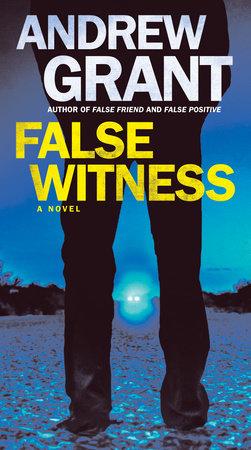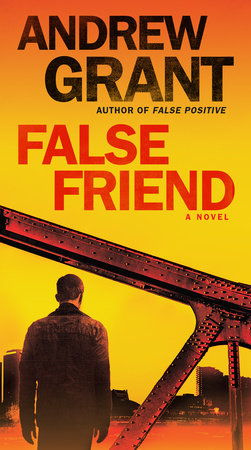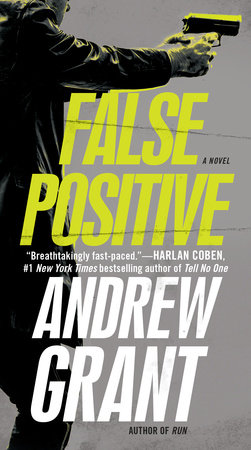Excerpt
False Witness
Chapter One
One year later.
On Friday morning, Eddie Standen found Deborah Holt’s body.
More accurately, he found a parcel about five foot six long by eighteen inches wide, neatly wrapped in a white bedsheet. A second sheet had been rolled up like a ribbon and tied around it, like the finishing flourish on a birthday present. Eddie had no reason to think it had been left for him. There was no label. No note. He could have ignored it and gone about his business. He wished he had, later, when he looked back. But he’d been intrigued. What could be inside the sheets? And why had it been left at the gates of the cemetery where he worked?
Cooper Devereaux was woken by the phone. He’d been in bed alone, in his apartment, which was a fairly new and unwelcome development. He’d spent almost every night at Alexandra Cunningham’s house, over the mountain, ever since they’d got back together a few months ago. Alexandra was his girlfriend, for want of a better word. She was also the mother of his daughter, Nicole. They’d been separated for eight years until a recent kidnapping case had unexpectedly brought them back in contact. Things had been going pretty well since then. What had started as small tentative steps had become strong confident strides in the course of rebuilding their relationship. Until certain facts about Devereaux’s background had come to Alexandra’s attention. She hadn’t taken them well. And as a result she’d been holding him at arm’s length the last couple of days, using ominous words like needing time to think.
Devereaux hoped it was Alexandra on the line, calling to reconcile.
It wasn’t.
“Cooper.” Lieutenant Hale’s voice was loud in his ear. “Get up. Right now. I need you at the Hoover cemetery. Go to the main gate. Tommy will meet you there. We’ve got a suspected homicide. It’s a weird one . . .”
Hoover cemetery had been designed in the Egyptian Revival style. The entrance, which also housed the facility’s office and storerooms, was set at the end of a winding, single-track road off Grove Boulevard. It was built to look like a ceremonial arch, and it spanned a small tributary from the nearby Black Creek. The idea was to symbolize the passage of the dead across the River Styx. That was fine in theory—assuming any grief-stricken mourners were in a state to pick up on the reference as they followed their loved ones on their final journey—but the reality was a nightmare for the maintenance guys. The foundations hadn’t been dug deep enough, so the walls of the building were constantly cracking and crumbling as the whole structure shifted and sank in the gritty, unstable earth. The site had been earmarked for closure half a dozen times in the last decade, but on each occasion a group of history-conscious local citizens had campaigned successfully for it to be spared.
A line of blue-and-white Birmingham Police Department sawhorses had been set up to block the road thirty yards from the arch. Devereaux pulled up behind a dusty black Dodge Charger, which he knew was issued to his longtime partner, Tommy Garretty. In front of that was a plain white panel van, which Devereaux guessed would belong to the crime scene unit. The case must be a weird one indeed, he thought, for those guys to have rolled on it so quickly. The vehicle at the front of the line was a BPD patrol car, parked sideways. A uniformed officer was leaning on its trunk with a clipboard in his hand. His job was to keep the scene secure and maintain a record of any essential personnel who were allowed to enter. Devereaux had hated that duty when he’d been in uniform. It had always seemed like torture, to be so close to the action but not to be allowed to take part. The guy working the fence that day didn’t seem too frustrated, though. He nodded to Devereaux as he approached. Handed the clipboard to him. Checked his entry for legibility. Asked politely to see his shield, to verify his badge number. Pointed out the designated entry and exit route to the left-hand side of the road. And then went back to enjoying the warm morning sun.
Devereaux made his way carefully between the parallel strips of crime scene tape until he reached Garretty and a pair of crime scene technicians who were standing near the entrance arch. On the ground in front of them, laid out on a white sheet, was the body of a young woman. She was naked. Her eyes were closed. Her long red hair was neatly arranged. Her right arm was stretched across her breasts, and her left hand was delicately covering the area between her thighs.
“So.” Devereaux looked across at the technicians. “Aside from the obvious, what have we got?”
The taller of the pair—a guy named Isringhausen, who Devereaux recognized from a couple of crime scenes they’d worked together in the past—eased down his mask. “Well, she’s a Caucasian female, as you can see. Age, late teens to early twenties. I’d say she was killed yesterday afternoon, maybe early yesterday evening, but the ME will put a better time frame on it. The cause of death looks like manual strangulation. See the thumbprints around her larynx? How clear and distinct the bruises are? Whoever killed her grabbed hold and didn’t let go till she was dead. Usually you see some blurring or a bunch of smaller marks where the killer had to adjust his grip or shift position. But not this guy. This was done by a strong, angry son of a bitch.”
“Was she sexually assaulted?”
“It looks that way.” Isringhausen sighed. “There are signs, but the ME will have to confirm.”
“Did you find any clothes? Or personal effects?”
“No. Nothing.”
“So we have no idea who she was?”
“None. I scanned her prints and sent them to the lab. We’ll hear back soon if she’s in the system. But I wouldn’t hold your breath. She was clearly healthy and well fed. There are no signs of drug use, so she probably wasn’t hooking. And look at her skin. Her hair. Her nails. That’s the result of some serious spa time, right there. So I’d say she wasn’t hurting for cash.”
“Was she killed here?”
“I doubt it. There are no signs of a struggle, and the soles of her feet are clean. So are her knees and elbows. Everything is, apart from the back of her right heel. No. I’d say she was killed somewhere else, brought here, and dumped.”
“It’s a good place for a dump site.” Devereaux looked around. “It’s secluded. There’s no chance of being seen from anywhere. You’d get good warning if anyone showed up. There aren’t any security cameras, I’m guessing?”
“There are, but they only point into the cemetery. They were put in three years ago, after there were some problems with graves being vandalized. Remember that Satanist cult thing? Turns out it was here.”
“Any indication where she might have been killed, assuming it wasn’t here?”
“Nothing so far. We’ll bag her hands and feet so the ME can get samples of anything microscopic that’s caught under her nails. I was hoping the sheets would be some kind of fancy brand that’s easy to identify, or that they’d have hotel logos on them or something, but no luck. They’re too ordinary to tell us anything on their own. We’ll take them to the lab anyway, though. See if there’s any trace evidence stuck to them, or soaked into them.”
“So if she was moved, how did she get here?”
“Someone drove her.” The second technician—a short, stocky guy named Ryan—pointed to the ground to their left. “Look over here. This soil isn’t the best for holding impressions. It’s too gritty. But you can see where a car or a small van stopped fairly recently. Then we’ve got three sets of footprints leading from that spot to where the body was found, and back. All the prints are the same size and pattern, so I’m guessing they were made by one guy, who made three trips. The first would be to set out the first sheet. The second, slightly deeper, to carry the body—if you look right there you can see an elongated oval impression, like maybe one of her legs slipped out of his grip, which could be when her heel hit the ground. And then the guy finished up with a final trip to tie up the package with the second sheet.”
“What was tied up? What second sheet?”
“You didn’t hear how she was left?” Garretty called up a photograph on his phone and passed it to Devereaux. “The guy who found her said the sheets were a lot neater, originally. He undid them a little bit to see what was inside. Once he found out, he tried to put them back like they were, but he didn’t do a great job. He was freaking out apparently. Seems strange, a guy who works at a cemetery being so upset by the sight of a dead body, but there you go.”
Devereaux studied the image then handed the phone back to Garretty. “Bizarre. I’ve seen plenty of bodies over the years, but none wrapped up like a birthday present. So, the guy who found her. Where is he?”
“In the office. A uniform’s keeping an eye on him. I didn’t want to talk to him till you got here.”
The cemetery office was dark and cramped. It smelled musty. And it didn’t have any of the things Devereaux normally associated with admin work. There were no desks. No computers. No filing cabinets. Just a pair of battered leather armchairs, a low wooden table, a coffee machine next to a stack of half-gallon water containers, and an old-fashioned fridge. A uniformed officer had been perched on the arm of one of the chairs, but she got up and excused herself as soon as Devereaux and Garretty arrived. That left just a guy in his mid-fifties, sitting on the deep windowsill on the far side of the room. He had on faded blue coveralls and heavy black work boots with traces of red mud around the soles and he was leaning forward with his head almost between his knees, breathing deeply.
“Mr. Standen?” Devereaux took a step toward the center of the room. “I’m Detective Devereaux with the Birmingham PD. This is my partner, Detective Garretty. Do you mind if we sit?”
Standen waved toward the armchairs without looking up, so Devereaux and Garretty made themselves comfortable.
“Do you mind if we call you Eddie?” Devereaux took out his notebook.
Standen grunted.
“So, Eddie, I’m sorry to hear you had a traumatic experience this morning. I’m sure you’d rather not revisit the details right now, but it would really help us if you could answer a few questions. Would that be OK? We’ll be as quick as we can.”
Standen straightened himself up, shuffled back on the windowsill, and ran both hands through his thick, curly graying hair. “Sure. If it’ll help. I guess.”
“Excellent.” Devereaux opened his book. “Now, let’s start with a little background. How long have you worked here, Eddie?”
“Thirty-seven years, this coming November.” There was a note of pride in Standen’s voice.
“That’s a long time.” Devereaux nodded appreciatively. “What is it that you do?”
“I’m a senior groundsman.” Standen pretended to slam his palm into his forehead. “Sorry, groundskeeper. I must learn to be more PC.”
“Mustn’t we all.” Devereaux flashed a reassuring smile. “So, you’re a senior groundskeeper. What does that involve?”
“What it sounds like, mainly.” Standen shrugged. “Keeping the grounds nice. If someone’s due to get planted—I mean, if there’s an interment coming up—I make sure the area around the new grave’s in good shape. And I tidy up afterward. You wouldn’t believe the mess people leave behind. I clear up the floral tributes people leave on graves, once they’re past their best. And then there’s the general upkeep of the whole graveyard. I prune the trees when they need it. I repair any headstones that fall over, and that happens a lot, specially with the older ones. That kind of thing.”
“What about office work? Do you spend a lot of time in here?”
“Not really.” Standen glanced sheepishly at the detectives. “This isn’t really an office, to tell the truth. It used to be, years ago, when the cemetery first opened. It was one of the first cemeteries not attached to a church in the whole state of Alabama. Did you know that? Because of the industrial revolution. The churchyards were overflowing with bodies, so they had to figure out something else to do with them. Anyway, these days we just use the place to get out of the sun when we need to. Grab a drink. Cool down. You know.”
“I get it.” Devereaux glanced at his watch. “I hear you were at work early this morning. Was there a special reason for that?”
“No.” Standen shook his head. “I always start early. What can I tell you? I’m an early riser. Always have been.”
“So you arrived at your regular time. Then what?”






